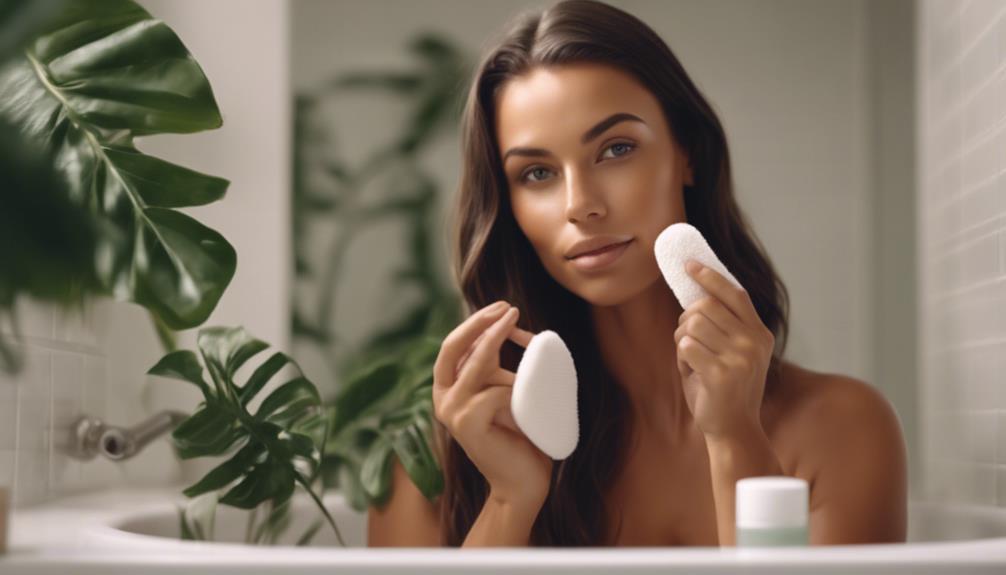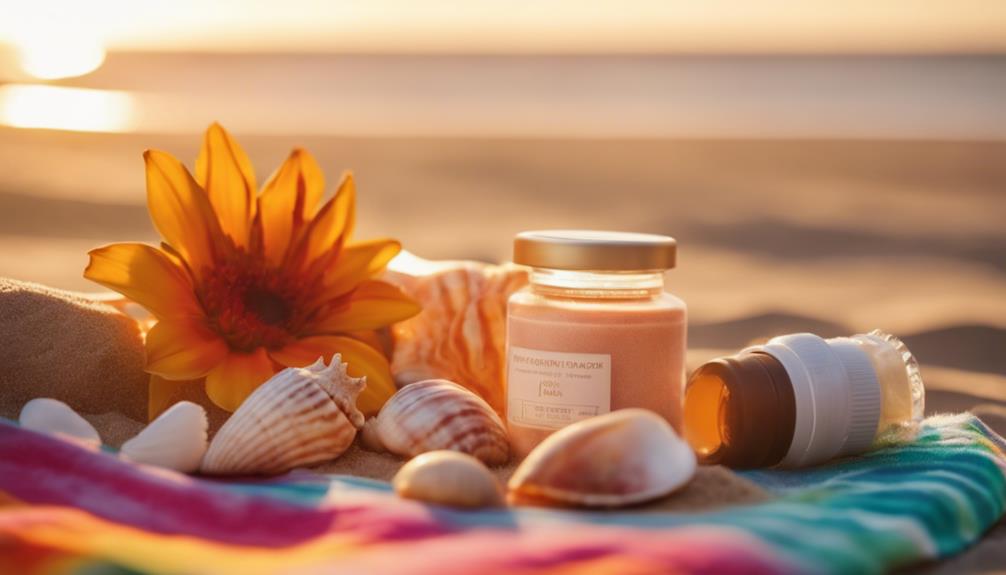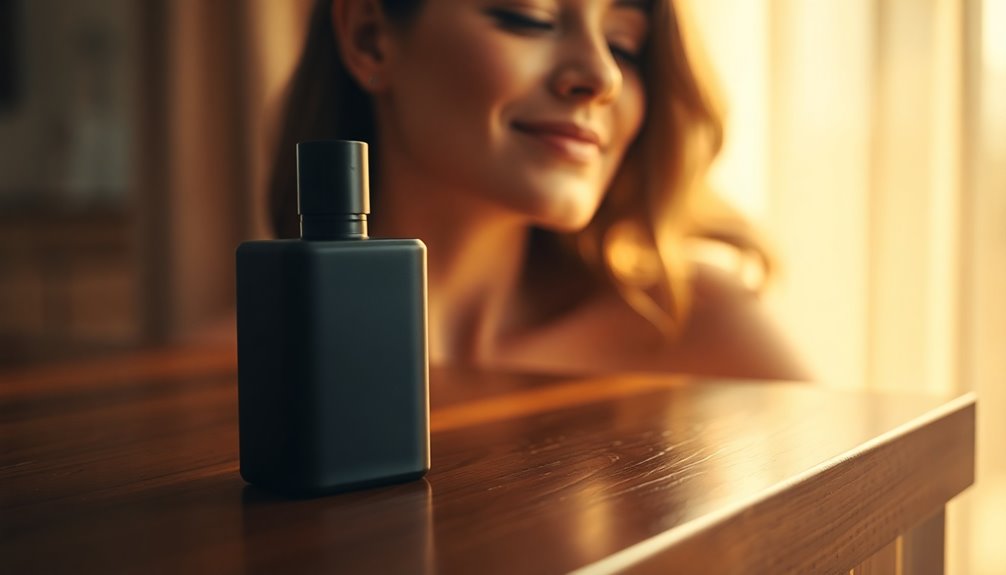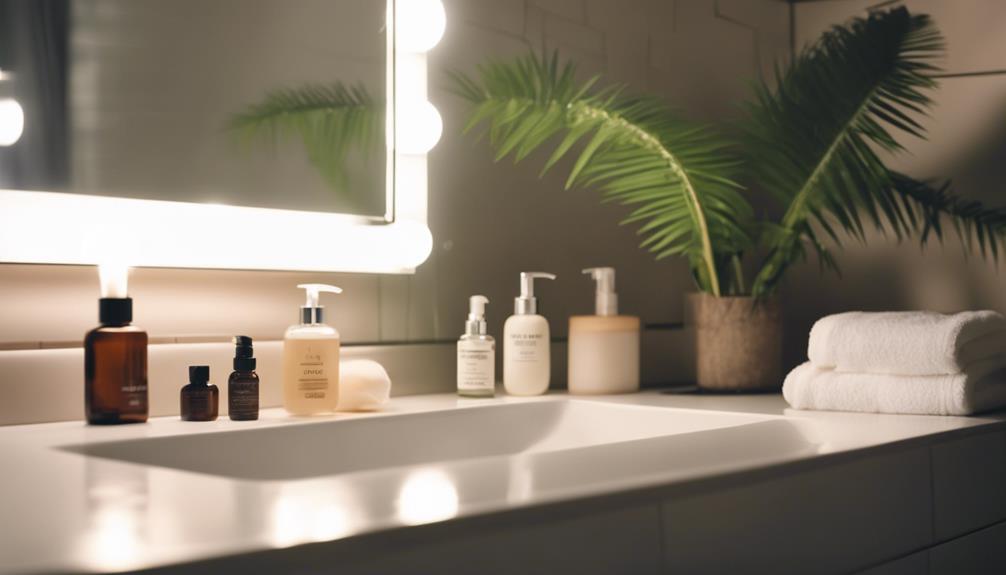Mastering freckle-free tanning is all about smart sun habits! Begin by applying broad-spectrum sunscreen with at least SPF 30, and remember to reapply every two hours, especially after swimming. Consider it as your skin’s shield against those sneaky sunspots. Slowly increase your sun exposure time, aiming for 15-20 minutes to prevent burns – no one wants lobster skin! If you prefer to avoid UV rays, consider using sunless tanning lotions or sprays for a bronzed look without the freckles. Additionally, fresh fruits and greens act as skin armor. Trust me, there is so much more to learn about achieving that perfect glow! And don’t forget, hydration is key – drink plenty of water to keep your skin plump and radiant. For an extra boost, incorporate skincare products with vitamin C to brighten and even out your complexion, giving you that gorgeous sun-kissed glow. As you prep for events, combine these techniques with holiday party beauty tips, like pairing your glowy skin with a shimmering highlighter or a bold lip to truly shine this season!
Key Takeaways
- Apply broad-spectrum sunscreen with at least SPF 30 before tanning to protect against UV exposure and minimize freckling.
- Gradually increase your sun exposure time to prevent burns and allow skin to tan slowly without developing freckles.
- Reapply sunscreen every two hours, especially after swimming, to maintain effective protection against harmful rays.
- Opt for sunless tanning products like lotions or sprays to achieve a bronzed look without UV exposure.
Sun Protection Strategies
To keep your skin freckle-free while tanning, you need to slather on a broad-spectrum sunscreen with at least SPF 30 and reapply it every two hours.
Think of sunscreen as your skin's best buddy—it's always got your back! Not only does it shield you from those sneaky UVA and UVB rays, but it also helps maintain your golden glow without pesky freckles popping up.
Remember to check the expiration date, because expired sunscreen is like bringing a rubber chicken to a party—totally useless!
Wearing a wide-brimmed hat and UV-protective sunglasses adds extra flair and protection, too.
Understanding Freckles

Freckles form when your skin cells produce extra melanin in response to UV rays, leading to those distinctive spots, especially on fair skin. If you've ever noticed tiny dots appearing after a sunny day, that's your skin's way of saying, “Hey, I'm getting a bit too much sun!”
Most people with fair skin, about 90%, will see more freckles when they bask in the sun. While freckles can be cute, they're also a reminder to protect your skin.
Think of your skin as a superhero; it needs the right gear to fight off sun damage. So, enjoy the sun, but don't forget your sunscreen!
What's your favorite way to stay sun-safe while catching some rays?
Effective Tanning Techniques

When aiming for a beautiful tan, gradually increasing your sun exposure time is key to minimizing the risk of burning and freckling. Start with short sessions, maybe 15-20 minutes, before gradually bumping it up. Think of it like building a sandcastle; you wouldn't dump all the sand at once, right?
Apply a broad-spectrum sunscreen with at least SPF 30, and don't forget to reapply every two hours—especially if you're splashing around in the pool!
Wearing a wide-brimmed hat can keep your face shaded, which is a great way to protect those delicate areas.
Sunless Tanning Alternatives

Exploring sunless tanning alternatives lets you achieve a bronzed look without the risks of UV exposure and freckling. Think of sunless tanning as your skin's best-kept secret!
You can choose from lotions, sprays, or mousses that give you that glow without stepping into the sun. Ever tried a professional spray tan? It's like magic—your skin looks flawless, and you don't have to worry about those pesky freckles.
If you prefer something gradual, moisturizing products let you build your tan day by day, so it looks super natural. Just remember to exfoliate first for an even finish.
Nutritional Support for Skin

Nutritional support plays an essential role in maintaining healthy skin and protecting it from sun damage. Think of your skin as a garden; what you feed it can make all the difference!
Here are four tasty ways to nourish your skin:
- Fruits and Veggies: Load up on colorful fruits like strawberries and oranges; they're packed with vitamins!
- Leafy Greens: Spinach and kale are superfoods that boost skin health. Seriously, they're like the superheroes of your plate!
- Green Tea: Sip on this invigorating drink; it's full of antioxidants that keep your skin glowing.
- Spices: Sprinkle turmeric and cinnamon into your meals for extra antioxidant power.
Common Concerns

Many people often worry about how to enjoy tanning while minimizing the risk of developing freckles. It's totally understandable; after all, nobody wants to look like a little polka-dotted cookie! One way to protect your skin while still achieving that sun-kissed glow is to use a broad-spectrum sunscreen with a high SPF. Additionally, wearing a wide-brimmed hat and seeking shade during peak sun hours can also help prevent freckles from forming. By taking these precautions, you can master your radiance and enjoy tanning without the worry of developing unwanted freckles.
The key is to be smart about your sun exposure. For starters, always slap on that SPF 30 sunscreen, and don't forget to reapply it every couple of hours. You wouldn't want to forget your favorite snack at a picnic, right?
Plus, wearing a wide-brimmed hat can help shield your face from those sneaky rays. And hey, try to avoid the sun during peak hours—it's like dodging a rainstorm!
With a little planning, you can achieve that sun-kissed glow without the freckly aftermath. Who's ready to shine?
Additional Tips for Success

To achieve the best tanning results while keeping freckles at bay, consistently follow your sun protection routine and listen to your skin's needs. Remember, it's all about balance!
Here are some additional tips for success:
- Hydrate: Drink plenty of water to keep your skin healthy and glowing.
- Choose the Right Time: Tanning early or late in the day means less intense sun exposure.
- Exfoliate: Gently scrub your skin before tanning to remove dead cells—this helps your tan last longer!
- Use a Tan Extender: Apply a moisturizer with a hint of color to maintain your tan and keep your skin hydrated.
Frequently Asked Questions
Can Certain Skincare Products Help Prevent Freckles While Tanning?
Yes, certain skincare products, like high-SPF sunscreens and antioxidants, can help prevent freckles while you tan. Regularly applying these products protects your skin and minimizes melanin production, keeping your complexion even and radiant.
What Are the Best Oils for Tanning Without Freckling?
Did you know about 90% of fair-skinned people develop freckles with sun exposure? To tan without freckling, consider using oils like coconut or carrot seed, which provide moisture while helping protect your skin from UV damage.
How Does Skin Type Affect Tanning Success and Freckle Prevention?
Your skin type greatly impacts tanning success and freckle prevention. Fair skin burns easily, leading to freckles, while darker skin tans more evenly. Always adjust your tanning approach based on your unique skin characteristics for best results.
Can Indoor Tanning Be Safer for Avoiding Freckles?
Indoor tanning can be like chasing shadows; it offers more control over UV exposure, potentially reducing freckle risk. However, it's still essential to use protection and follow safety guidelines to guard your skin.
What Role Does Hydration Play in Skin Health While Tanning?
Hydration plays an essential role in skin health while tanning. You should drink plenty of water to keep your skin moisturized, which helps maintain elasticity and reduces the risk of damage from UV exposure.
Can Using Tanning Lotion Help Prevent Freckles During Tanning?
Using master tanning lotion application techniques can definitely help prevent freckles during tanning. By applying the lotion evenly and in the right amount, you can ensure that your skin is protected and less prone to developing freckles. It’s important to follow proper techniques to achieve the best results.
Conclusion
So, as you plunge into the world of freckle-free tanning, remember that 30% of people in the U.S. have freckles! Isn't that wild?
By following these sun protection strategies and choosing the right techniques, you can achieve that gorgeous glow without worrying about unwanted spots.
Just think of your skin as a canvas—let's make it shine!
So, grab your sunscreen, plan your sun time wisely, and embrace the sun responsibly.
You've got this!









